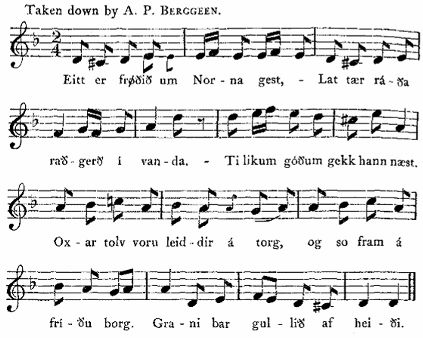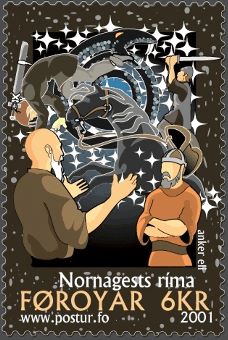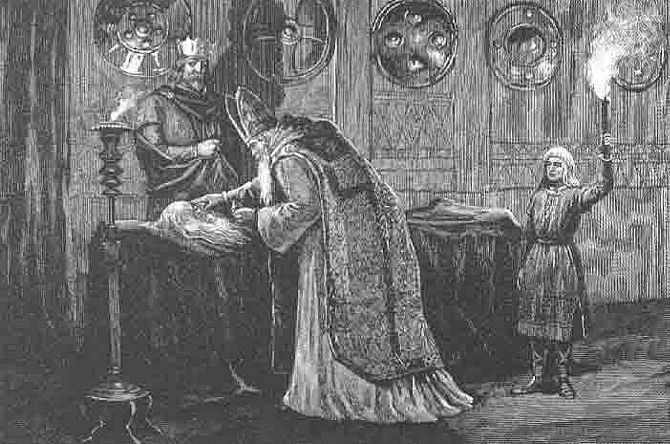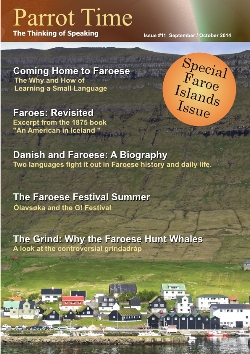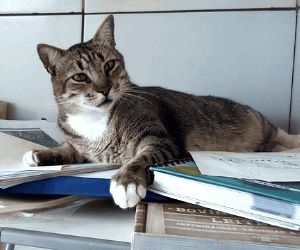|
1. Eitt er frøðið um Nornagest,
-tú tarvst onki ráð geva í vanda-
Tílíkum góðum gekk han næst,
-hvør ein sveinur geri so-
Oksar tólv vóru leiddir á torg
Og so fram á fríðu borg
2. Hvíta tjald nívir niður frammi.
Enn gellir lúður í stavni,
Kallur kom heim við ungum syni,
Kelling situr so hákonu blíð,
Hvíta tjald nívur niður frammi.
3. Kongur ætlar at høgga teir,
-tú tarvst onki ráð geva í vanda-
Tílíkum góðum gekk tað við gleim.
-hvør ein sveinur geri so-
Kongurin hjó so mikið høgg,
At blóðið dreiv við benjar døgg
4. Allir duttu teir deyðir niður,
-tú tarvst onki ráð geva í vanda-
Øxin stóð í stokki við.
-hvør ein sveinur geri so-
Allir lovaðu hilmarhøgg,
Blóðið dreiv um benjardøgg.
5. Har kom kall við høkjur tvær,
-tú tarvst onki ráð geva í vanda-
Studdist so fast á báðar tær.
-hvør ein sveinur geri so-
Kongurin kvøður kalli blíttt:
”Hví lovar tú ikki høggið mítt”
6. Yvrið harra var høggið títt,
-tú tarvst onki ráð geva í vanda-
Í forðum sá eg vænari slíkt.
-hvør ein sveinur geri so-
Tá skalv bæði leyv og lund,
Sjurður høgg ormin í miðju sundur.”
7. anst tú siga frá Sjurð svein,
-tú tarvst onki ráð geva í vanda-
Hann var frægur av fornum ein.
-hvør ein sveinur geri so-
Tað kann eg siga Sjurði frá,
Tílikan eingin við eygum sá.
8. Høgni var ein heiðursmann,
-tú tarvst onki ráð geva í vanda-
Ljotan av lit so kendi eg hann.
-hvør ein sveinur geri so-
Gunnar var so reystur og ríkur,
Fróður og blíður og Gunhild líkur.
9. Fróður og blíður og Gunhild líkur,
-tú tarvst onki ráð geva í vanda-
Seint man føðast annar slíkur.
-hvør ein sveinur geri so-
Faðir mín átti fríðdligt bú.
Fjól tað mikið um manga kú.
10. Eg sat á skógvi og goymdi hest,
-tú tarvst onki ráð geva í vanda-
Helst tá ið veðurið var best.
-hvør ein sveinur geri so-
Riðu teir um dikið heim,
Gunnar og Høgni og Sjúrður svein.
11. Ríðu teir um díkið tá,
-tú tarvst onki ráð geva í vanda-
Eg var sevin og sá hará.
-hvør ein sveinur geri so-
Gunnars hestur sprakk um fyrst,
Gunnar kandi væl tann dyst.
12. Høgna hestur sprakk um tá,
-tú tarvst onki ráð geva í vanda-
Grani fastur í feni lá.
-hvør ein sveinur geri so-
Sjúrðar hestur sprakk um síðst,
Tá gav Guð mær goðan list.
13. Grani fell í fenið fast,
-tú tarvst onki ráð geva í vanda-
Galtagjørðin sundur brast.
-hvør ein sveinur geri so-
Allir stigu úr søðlum teir,
Gunnar, Høgni og Sjúrður svein.
14. Allir tuga á dýran hest,
-tú tarvst onki ráð geva í vanda-
Sjúrður tugar á teymar mest.
-hvør ein sveinur geri so-
Ofta havi eg um díkið trott
Bæði dag og døkka nátt.
15. Gestur, ger mær viljan ein
-tú tarvst onki ráð geva í vanda-
Tváa mín góða gangara rein'.
-hvør ein sveinur geri so-
Sylgjan, íð sundur brast fyri mær,
Hana, Gestur, gevi eg tær.
16. Riðu so fram at eina á,
-tú tarvst onki ráð geva í vanda-
Eingin kundi til manna sjá.
-hvør ein sveinur geri so-
Eg tváaði hans bróst og bringa rein',
Hans lær og legg og langa bein.
17. Góðan gangara gjørdi eg rein',
-tú tarvst onki ráð geva í vanda-
Síðan hevði meg Sjurður til svein. .
-hvør ein sveinur geri so-
Vær ríðum so fram á Fávnis ból,
Har skein gull sum geisar av sól.
18. Eg tók eitt hár av sama hesti,
-tú tarvst onki ráð geva í vanda-
Tað var sítt og vaxið mest.
-hvør ein sveinur geri so-
Tað var favn og feti sítt.
Glógvaði rætt sum silvur hvítt.
19. Eg havi í forðum farið vítt,
-tú tarvst onki ráð geva í vanda-
Ei funnið ljós og lívið mítt.”
-hvør ein sveinur geri so-
Kongur gav honum skaft og skeið,
Og sjálvur segði han kalli leið.
20. Í Fraklandi er vatnið vítt,
-tú tarvst onki ráð geva í vanda-
Har er ljós og lívið títt.
-hvør ein sveinur geri so-
Leingi kavaði kurtis mann,
Áður hann beint á blýggið fann.
21. Kørnar prestur skírði hann,
-tú tarvst onki ráð geva í vanda-
Tá leið lív sum ljósið brann.
-hvør ein sveinur geri so-
Tá ið ljós í lyktu var brent,
Tá var lív og levnað ent.
22. Hvíta tjald nívir niður frammi.
Enn gellir lúður í stavni,
Kallur kom heim við ungum syni,
Kelling situr so hákonu blíð,
Hvíta tjald nívur niður frammi.
|
1. It is said about Nornagest,
refrain 1: -You need not give any advice in danger-
He was always close to the mighty ones.
refrain 2: -Do so every swain-
Twelve oxen were led to the square
And to the front of a fair castle.
2. The white tent presses down in front.
Still resound the trumpets in the stem,
The man came home with his young son,
The giantess sits as tender as the sandgirl,
The white tent presses down in front.
3. The King intends to slay them,
- refrain 1 -
An easy task for such a mighty man.
- refrain 2 -
The King struck sich a mighty blow,
That the blood and blood poured.
4. All the oxen fell down dead,
- refrain 1 -
The axe stood firm in the stump.
- refrain 2 -
All praised the stroke of the King,
The blood and blood poured.
5. There came a man with two crutches,
- refrain 1 -
He leaned so hard on them both.
- refrain 2 -
The King greets him courteously:
Why do you not praise my stroke?
6. Your stroke was firm and eager,
- refrain 1 -
But I have seen a better one in the past.
- refrain 2 -
Leaves and groves were shaking,
When Sigurd hacked the serpent in two.
7. You may have heard of bold Sigurd,
- refrain 1 -
He alone was the best in the past.
- refrain 2 -
I can say this about Sigurd,
No one has ever seen such a man.
8. Högni was a man of honour,
- refrain 1 -
But I knew his ugly mien.
- refrain 2 -
Gunnar was so brave and mighty,
wise and friendly and like Gunhild.
9. Wise and friendly and like Gunhild,
- refrain 1 -
His match will never be born again.
- refrain 2 -
My father owned a peaceful farm
He hosted a lot of cattle there.
10. I was in the forest herding horses,
- refrain 1 -
Especially when the weather was fine.
- refrain 2 -
They all rode home by the moor,
Gunnar, Högni and Sigurd swain.
11. They all rode around the moor,
- refrain 1 -
I was a boy and watched them.
- refrain 2 -
Gunnar's horse jumped over first,
Gunnar knew that sport so well.
12. Högni's horse jumped over next,
- refrain 1 -
Fast stuck Grani in the fen.
- refrain 2 -
Sigurd's horse jumped the last,
He did so with great joy.
13. Grani fell and stuck in the mud,
- refrain 1 -
the saddle girth broke in pieces.
- refrain 2 -
they all jumped from their saddles,
Gunnar, Högni and Sigurd swain.
14. They all pulled the precious horse,
- refrain 1 -
Sigurd pulled the most.
- refrain 2 -
I have often walked the moor,
both by day and the darkest night.
15. Gestur, please do me a favour,
- refrain 1 -
Wash my good steed clean.
- refrain 2 -
The saddle buckle which broke for me,
Gestur, I will give to you.
16. We rode on to a river,
- refrain 1 -
Where no man was in sight.
- refrain 2 -
I washed his breast and chest,
His thigh and shin and long leg.
17. I washed the good steed clean,
- refrain 1 -
Since then I was Sigurd's swain.
- refrain 2 -
Then we rode to Fafnir's lair,
there shone gold like sunbeams.
18. I took a hair from the horse's tail,
- refrain 1 -
it was long and grown the most.
- refrain 2 -
It was a fathom and one feet long,
it shone just like white silver.
19. I travelled far and wide in the past,
- refrain 1 -
Never found my candle nor light of days.
- refrain 2 -
The king gave him shaft and ship,
and showed the old man the way himself.
20. In Land of the Franks the water is wide,
- refrain 1 -
There is the light and your life.
- refrain 2 -
The noble man groped for long,
before he found the lead.
21. Körnar the priest baptized him,
-You need not give any advice in danger-
His life lived as the light burned down.
-Do so every swain-
When the light of the lantern burned down,
then his live and existence ended.
22. The white tent presses down in front.
Still resound the trumpets in the stem,
The man came home with his young son,
The giantess sits as tender as the sandgirl,
The white tent presses down in front.
|

